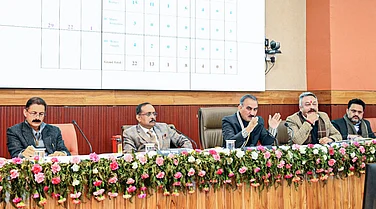The panel of former high court judges formed by Supreme Court of India to overlook the relief and rehabilitation work/efforts in Manipur has presented three separate reports. This was followed by a detailed analysis of the ground-level situation in the northeastern state. These reports pertain to the restoration of crucial documentation of people that were lost, upgrading the compensation from what was initially decided, restoration of homes and places of worship, and lastly selection of subject-matter specialists to aid the committee’s tasks.
These recommendations came from the panel headed by former Jammu and Kashmir High Court Chief Justice Gitta Mittal, the committee also includes former Bombay High Court judge Justice Shalini Phansaklar and former Delhi High Court judge Justice Asha Menon. After submitting the recommendation, the Supreme Court said they would provide a detailed report on the same in the next hearing on Aug25th.
The apex court has also directed that the recommendations report should be made available to all the lawyers on record representing various petitioners relating to the Manipur issue. In addition to that, the court also felt the need to pen down certain procedural guidelines to offer administrative support, allocate funds to the committee, and publicize the work by the panel. Alongside these, Advocate Vrinda Grover was entrusted with all the above-mentioned responsibilities. She is also directed to convey the same to the Manipur advocate General by August 24, for the matter is yet to be heard on August 25.
What’s in the report?
The reports submitted by the panel talks about the loss of documents of the people who eventually lost their homes during the violence in the state. The committee also put ahead the need of appointing a nodal officer who would look after the recovery of such lost documents of people, especially crucial documents such as Aadhar card.
An additional issue highlighted in the reports is related to the victim compensation program. The committee recommended improvements to the structure of compensation. The current scheme's stipulation, which excludes individuals who are already beneficiaries of other programs, was underscored.
The report also emphasised the importance of having an expert in nodal administration to streamline the administrative procedures linked with the proceedings of the case.
A recap
The Supreme Court formed an all-women’s judicial committee to scrutinse the ongoing investigations that aims at providing justice to the victims of Manipur violence.
The apex court laid down points to justify the formation of this panel and the importance of such a committee which will help in an unbiased investigation.
There are noteworthy delays observed in various stages of the legal process. These encompass substantial gaps between the occurrence of serious offences like murder, rape, and arson, and the initiation of zero First Information Reports (FIRs). Additionally, there are prolonged periods before these zero FIRs are forwarded to the specific police stations vested with jurisdiction over the incidents.
Subsequent to this, the conversion of these zero FIRs into regular FIRs by the pertinent jurisdictional police stations is also frequently postponed. The process further experiences sluggishness when it comes to recording statements from witnesses, causing a slowdown in the overall proceedings.
Furthermore, there is a discernible lack of diligence in properly documenting statements in accordance with the guidelines outlined in Section 161. This cumulative effect of delays and inefficiencies at various stages underscores the need for improvements in the legal and investigative procedures.




















.png?w=200&auto=format%2Ccompress&fit=max)





